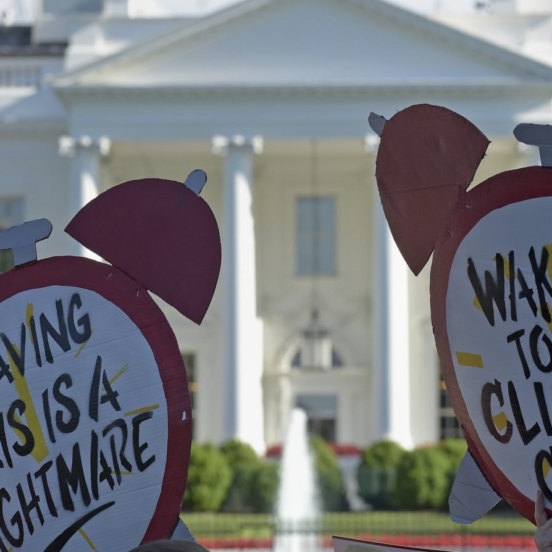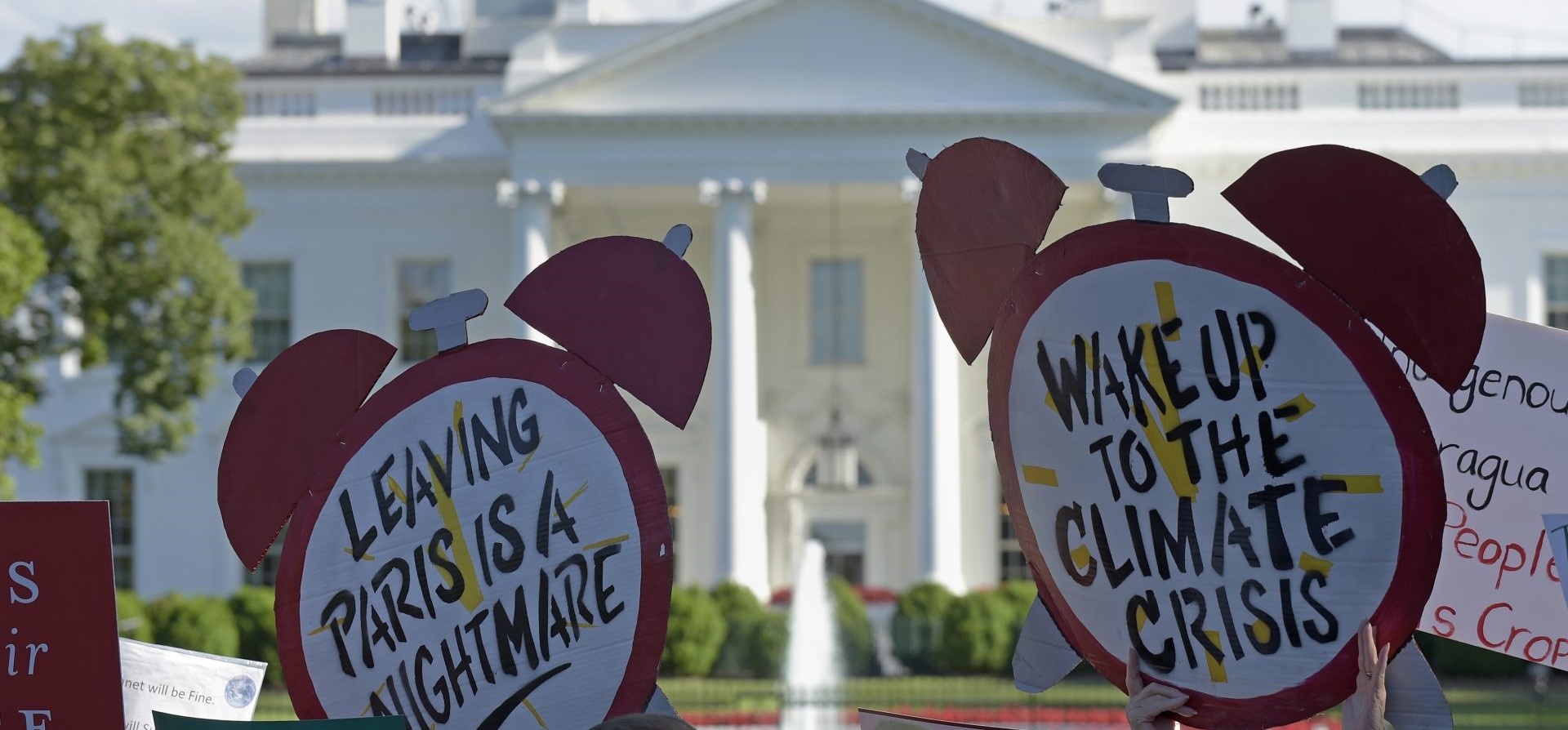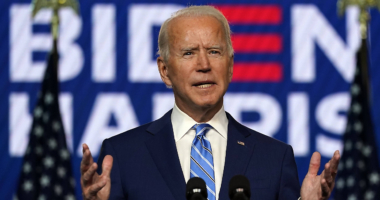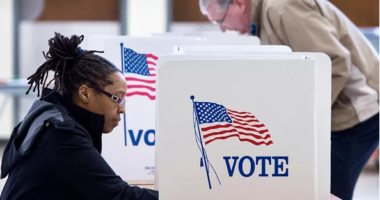Climate, Health and Equity Brief
Vote for emissions reductions and a green economy
October 23, 2020

The Climate, Health & Equity Brief is GMMB’s take on the week’s news on the current impacts of climate change. If you haven’t subscribed yet, you can do so by clicking here.
Hot Topic: Eleven days. This Election Day, the stakes are higher than ever to ensure the protection of our planet and a healthy future for all. November 3—and every day until then, as Americans vote early and mail in their ballots—will be an opportunity to correct the Trump administration’s trajectory towards climate catastrophe. The choice is clear. While Democratic presidential nominee Joe Biden’s environmental platform prioritizes reducing emissions and transitioning to a clean energy economy, the Trump administration has spent the last three and a half years systematically dismantling our environmental protections.
But don’t take our word for it. This week, The New York Times and The Guardian both published summaries of Mr. Trump’s 99 environmental rollbacks. Despite his claim during last night’s debate that “we have the cleanest air, the cleanest water and the best carbon emission standards,” Trump’s assault on the environment has moved us in exactly the opposite direction. A sampling of his actions include the following:
- Withdrawing the U.S. from the Paris Climate Agreement, which would commit the U.S. to help limit global heating to 2°C above pre-industrial temperatures;
- Revoking or relaxing more than 20 rules implemented by previous administrations to reduce greenhouse gas emissions and pollution;
- Refusing to strengthen air pollution standards to protect against small particulate matter, which is associated with chronic bronchitis, reduced lung function, and increased death rates from lung cancer and heart disease;
- Repealing rules to phase out hydrofluorocarbons (HFCs), a major greenhouse gas used in refrigeration, air conditioning and building insulation, thereby increasing emissions by the equivalent of 2.9 million tons per year;
- Allowing agencies undertaking federal infrastructure projects to evade accounting for the impact of those projects on the environment and climate change;
- Scaling back Clean Water Act regulations for wetlands and tributaries, and allowing coal plants to discharge toxic waste into nearby waterways;
- Allowing oil and gas development in the Arctic National Wildlife Refuge, the last remaining stretch of true wilderness in the United States;
- Disregarding environmental and health concerns to approve construction of the controversial Dakota Access pipeline; and
- Continuing to disregard and devalue climate science despite the extreme weather events now putting every region of the country at risk.
Of course, the consequences of climate change are only exacerbated by these actions, and the results are already being felt around the globe and here in the U.S, where wildfires, hurricanes, heatwaves and droughts have all shattered records in 2020.
In contrast to Mr. Trump, Democratic candidate Joe Biden’s climate plan—the most ambitious ever proposed by a major U.S. presidential candidate—would transition America to a clean-energy economy and prioritize the emissions reductions that are now critical to the protection of the planet. There has simply never been a more important time for all of us to make our votes count.
—Matt & Traci, GMMB
Health
A new report revealed that air pollution was the fourth leading risk factor for global premature deaths in 2019, killing nearly seven million people, including 500,000 babies in their first month of life. (EcoWatch, The Guardian)
Government forecasters revealed that more than 45 percent of the continental U.S. is currently in drought and that “extreme and exceptional” conditions exacerbated by climate change could worsen drought across the Southern half of the U.S. this winter. (The New York Times)
Records continue to be set in the Western U.S. this fire season as Colorado battles its largest-ever wildfire, along with at least four other major fires across the state and in neighboring Utah. (CNN)
Unusually heavy rainfall in Vietnam fueled by a La Niña weather system has resulted in the country’s most severe floods in decades, killing more than 100 people and inundating farms, homes and critical infrastructure. (CNN)
Equity
The New York Power Authority has committed to transition six natural gas plants located in predominantly low-income and minority communities to clean energy technologies. (Politico)
Navajo Nation farmers in northeastern Arizona, already contending with extreme drought conditions, face a growing threat to their livelihoods as once-common snowfall on nearby mountains grows scarce, decreasing their natural water supply. (The New Republic)
The Jicarilla Apache Nation has partnered with the city of Albuquerque, NM on a 400-acre solar farm project that will move the city closer to its goal of 100 percent renewable energy by 2030 and bring renewable energy jobs to the Apache people. (NRDC)
Politics & Economy
Want to fact check last night’s debate? Check out and share these comprehensive summaries by The Guardian and The New York Times, which outline every environmental rollback undertaken by the Trump Administration over the last four years. (The Guardian, The New York Times)
Supreme Court nominee Amy Coney Barrett refused to publicly accept climate science during a confirmation hearing last week, calling climate change a controversial and contentious topic. (The Guardian)
This week ExxonMobil moved to discredit a Harvard report revealing that the oil giant misled the public on climate change, while Mr. Trump publicly bragged that he could call on ExxonMobil for donations in exchange for political favors. (Inside Climate News, The Washington Post)
A new report revealed that with low-cost financing from the government, U.S. households could save an average of $2,500 on annual energy costs by decarbonizing their homes. (Fast Company)
As voters across the U.S. begin casting their ballots, check out this in-depth guide to the major climate questions to consider this election season. (The New York Times)
Action
General Motors announced a $2.2 billion investment this week to boost production of electric vehicles and increase its manufacturing operations in the U.S. (CNBC)
Furniture retailer Ikea announced that it will launch a new buyback program for unwanted Ikea furniture in 27 countries to promote sustainability and discourage excessive consumption. (The New York Times)
Kicker
Gearing up for election day? Join Your Vote, Your World, a digital rally hosted by Earthday.org, the Hip Hop Caucus and the Climate Reality Project on Saturday, October 24 at 1pm ET to explore what’s at stake this election season.
“Protecting our planet is on the ballot. Vote like your life depends on it—because it does.”
– Former President Barack Obama






